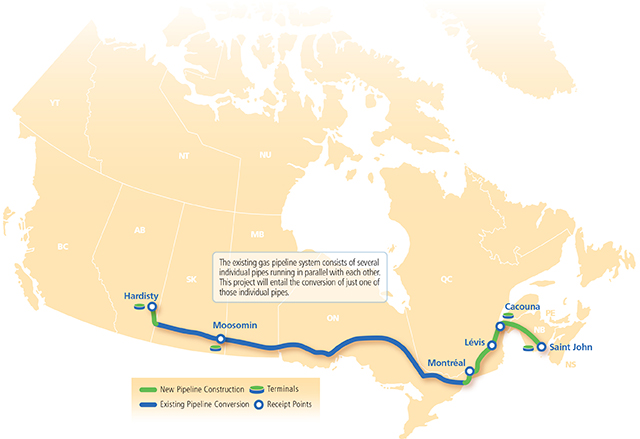CALGARY – TransCanada Corp. says its regulatory application for the proposed Energy East pipeline is a massive document with 30,000 pages that provide a comprehensive analysis of the project’s impact on the economy and environment.

The $12-billion project would be one of the biggest infrastructure projects ever built in Canada, spanning six provinces and 4,600 kilometres.
It would ship Alberta crude through pipe that’s already in the ground for two-thirds of the way, with new pipeline being built through Quebec and New Brunswick.

The application to the National Energy Board is an important step in TransCanada’s efforts to get approval for the Energy East project.
“Our application outlines how Energy East will be built and operated in a safe and environmentally responsible manner, while generating significant benefits for all Canadians,” TransCanada president and CEO Russ Girling said in a statement early Thursday.
On Thursday, Alberta Premier Jim Prentice responded to news of the application with the following statement:
“The Energy East Pipeline represents a true nation-building project. Today’s application for approval is a significant step towards getting full market value for Canada’s resources, and will help the country realize its economic potential.”
“Not only will it connect the oil resources of western Canada with refineries in eastern Canada and to global markets, it will connect Canadians by creating jobs and supporting businesses from coast-to-coast. Energy East will also improve Canada’s self-reliance by significantly reducing the amount of oil that we import.
“Energy is a unifying theme across Canada, whether it be oil, hydroelectricity or other forms. And for Canada to prosper, this energy needs to get to markets. Alberta supports all safe and viable options to diversify and expand market access for Canada’s resources.
“We respect the National Energy Board hearing process and have full confidence that the panel will make its decisions based on science and factual evidence.”
TransCanada has been busy over the past several months seeking support for the project. It’s held dozens of open houses across the country and has hired Phil Fontaine, former chief of the Assembly of First Nations, to help get aboriginal groups along the route on board.
Energy East would deliver crude to export terminals planned for Quebec and New Brunswick, enabling shipments to Europe, India and other destinations and garnering a better price for Alberta producers.
TransCanada also touts the project as a boon to Eastern Canadian refineries. It aims to supply cheaper inland crude to refineries in Quebec and New Brunswick, supplanting imports from the Middle East and other foreign locales. Environmental Defence and Greenpeace called that claim into question in a report this week, arguing TransCanada is exaggerating the pipeline’s domestic benefits as supplies from U.S. shale deposits surge.
READ MORE: Report: Energy East no boon for refiners
The project has drawn the ire of environmental groups concerned about the impact of a potential spill. Many also see it as an enabler of growth in oilsands development and the rising greenhouse gas emissions that would result. Groups have lambasted the National Energy Board for declining to consider climate change when weighing major pipeline projects.
The proposal has also raised concerns about how the conversion of natural gas pipe to oil service could affect gas supplies flowing east. Sophie Brochu, the head of Quebec’s largest natural gas distributor, said last week that the project will raise prices and reduce employment if implemented as proposed.
TransCanada has stressed that Canadian supplies of gas won’t be affected by Energy East, as a branch of its mainline network that exports gas to the United States is being converted to oil markets.
New Brunswick is keen on the project, with newly minted premier Brian Gallant travelling to Alberta last week to express his support. It’s not clear that Ontario and Quebec are as enthusiastic.
The Ontario Energy Board has been conducting a review of its own and has held well-attended meetings throughout the province. The OEB will help the provincial government form a position on the pipeline, but it’s questionable how much weight that will carry. Ontario’s position will be considered by the NEB, but it doesn’t have final authority.

Comments